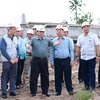Bilateral cooperation covers most areas, ranging from politics; economics, trade and investment; energy, oil, gas and nuclear power; to national defence and security, he told the Russian news agency TASS, adding that Vietnamese and Russian localities were also expected to join the effort via regular exchanges.
The visit takes place at a time when the bilateral comprehensive strategic partnership has been progressing nicely. Nguyen Phu Trong will join President V.Putin and other Russian leaders in taking stock of the implementation of high-level agreements reached in the past as well as the progress of major projects.
The leader also highlighted the role and significance of regular exchanges and dialogue mechanisms at all levels, saying that the two countries considered them a crucial tool to deepen the comprehensive strategic partnership that came into being in 2012, thereby enhancing political trust and relations between the two States, governments and legislative bodies.
In line with the diplomatic policy of independence, self-control, peace, cooperation and development, multilateralisation, diversification and international integration, Vietnam continuously regards Russia as one of the most important and trustworthy partners, Nguyen Phu Trong said.
Asked what the most progressive fields in the bilateral partnership are, the Party chief listed economics, trade, energy, national defence-security, education-training, science-technology, and culture.
Two-way trade soared to approximately 4 billion USD last year from 300-400 million USD in the 1990s. In addition to Vietsovpetro, oil and gas ventures such as Rusvietpetro, Vietagazprom and Gazpromviet are operating effectively. Since energy is a traditional cooperation field, Vietnam is actively building Ninh Thuan 1 nuclear power plant with Russian support in financing, technology and human resources.
Joint efforts in mining, metallurgy, education-training, science-technology, outer space exploration and people-to-people exchanges will become more expansive since a high-level working group on priority projects was established.
Both nations regularly hold cultural exchanges and extend collaboration on tourism. Russia is amongst the top 10 sources of tourist arrivals in Vietnam.
In the coming time, Vietnam and Russia will further strengthen their political, diplomatic and economic ties based on the three pillars of trade, investment and energy.
Elaborating on Vietnam’s role in the expansion of the Russia-ASEAN relationship, the Vietnamese leader recalled the second ASEAN-Russia Summit hosted by Vietnam in 2010, with the ASEAN member states supporting Russia’s participation in regional forums in which ASEAN plays a decisive role, including the East Asia Summit (EAS) and the ASEAN Defence Ministers’ Meeting Plus. Russia attended the fifth EAS in 2010 in Vietnam as a guest and officially joined other meetings in 2011.
Vietnam is also working with Russian and other ASEAN member states to prepare for the 20 th anniversary of the ASEAN-Russia dialogue partnership.
In the coming time, the country will continue to be a bridge between ASEAN and Russia and find a common voice in key global and regional issues, especially those directly affecting their common interests in the maintenance of regional peace, security and stability, including the East Sea issue.
Together with ASEAN and Russia, Vietnam will also actively and proactively identify limitations in their partnership and seek solutions to them, the leader promised.-VNA



















